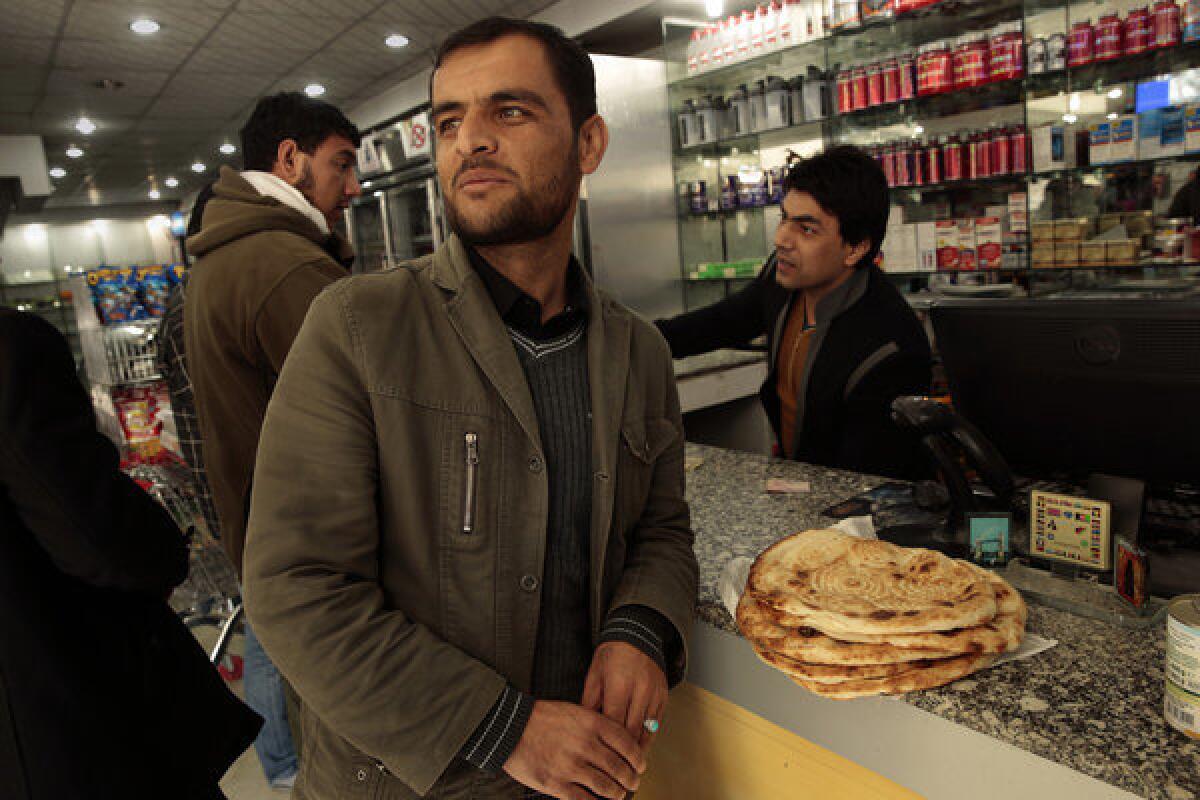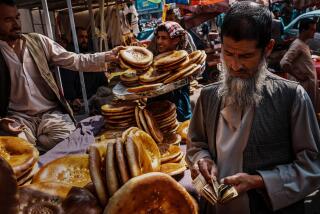Afghanistan: Karzai baffles, frustrates as he rejects advice

KABUL, Afghanistan — From presidential candidates to grocers and spice merchants, many Afghans threw up their hands in frustration and exasperation with their elected president on Monday. They had watched Hamid Karzai on TV the day before, and many were baffled by what they saw.
Karzai had brusquely rejected the recommendations of a special grand council he had personally convened to vote on whether Afghanistan should sign a security agreement with the United States. After the council, or loya jirga, enthusiastically endorsed the pact, Karzai refused to sign and launched an angry diatribe against the United States. It ended in a tense face-off with the elderly loya jirga chairman, who supports the deal.
It was a remarkably emotional and erratic display, even by a president notorious for unpredictability and volatility. It came after Karzai’s appointed loya jirga delegates pleaded with him to sign before a year’s-end deadline imposed by the United States.
“It was the first time he lost his composure in front of the nation,” Atiqullah Baryalai, Karzai’s former deputy defense minister, said in an interview at his Kabul compound. “He is now marginalized from his own people.”
Karzai’s defiance has corroded his relations with the United States and with many of his own citizens. His rambling comments alienated some Afghans, who said they were perplexed, for instance, by his vague new demand that the U.S. somehow guarantee peace in this war-ravaged nation.
“This president — I don’t have any idea what he’s doing,” Azrakhsh Hafizi, a loya jirga committee chairman who is also directs the Afghanistan International Chamber of Commerce in Kabul, said in an interview. “Presidents come and go, but the people are the owners of this country. He should listen to them.”
A single question dominated conversations with bewildered Afghans on Monday: Why would Karzai insist on convening a loya jirga of prominent citizens from around the country, then so cavalierly brush them off when he didn’t like what they told him?
“You could just see the discomfort and confusion in the loya jirga when the president spoke,” said Farkhunda Zahra Naderi, a member of parliament, said in an interview. “These are people with influence and power. They reflect the will of the Afghan people, but their decision was ignored.”
Virtually all 50 loya jirga committees recommended not only signing the 10-year agreement, but doing so before the end of the year. Karzai insists on waiting until after the Afghan presidential election in April.
The loya jirga is an advisory body, but the councils have a long and respected tradition as a democratic means of gauging public opinion on matters of surpassing national interest. Karzai had indicated he would abide by the council’s recommendations.
Instead, his address infuriated many Afghans, as well as the United States. He angrily accused U.S. soldiers of raiding Afghan homes and killing civilians. He rebuked the loya jirga and refused to sign the security deal even after agreeing with the U.S. last week on the text of the 24-page pact.
“Really, it’s like he’s losing control of his mind,” former defense official Baryalai said. “He makes new problems for himself every day.”
Of Karzai’s demand that the U.S. somehow secure peace in Afghanistan before he’ll sign the agreement, Baryalai added: “I have no idea what that means. Nobody does.”
Sayed Mujtaba, 30, a grocer, said, “The president thinks he knows what’s good for the people, but the people have already said through the loya jirga they want this agreement.” Mujtaba wants Karzai to sign now to avoid a cutoff of U.S. military support and development aid.
Mohammed Haroon, 23, who runs a spice shop, spoke for many small businessmen who fear the country’s economy cannot survive without billions of dollars in U.S. and international aid. The World Bank office in Kabul, in a report last month, called Afghanistan’s economy “highly aid dependent” and said uncertainty over post-2014 security is battering the fragile economy.
“If the foreigners leave next year,” Harroon said, referring to U.S. and international combat troops, “then the next day, the Taliban will be back and taking over.”
The absence of a post-2014 U.S. force here could plunge the country back into civil war, warned Said Kamal, 26, a grocery shopper. “Karzai needs to sign for the country’s security — and now,” he said.
Ghulam Nabi, 30, a baker, fears Karzai is putting the entire nation at risk for his own political ambitions. “He cares about his own political career, and also avoiding any blame” for cutting a deal with the United States, Nabi said.
Karzai’s performance has rattled political allies and the military, according to some Afghan politicians. Naderi said there is confusion and uncertainty within Karzai’s political team, with certain advisors providing “some very bad advice.”
“A lot of people, including myself, didn’t think we needed this jirga,” Naderi added. “But don’t forget it was the president who insisted on it in the first place.”
Afghan army commanders are concerned that no security pact would mean no pay for 350,000 soldiers and police and no U.S. military trainers or logistical support. Afghan security forces took the lead in combat operations for the first time this summer. They held their own against a determined Taliban insurgency, backed by American trainers, supplies, logistics and — in emergencies — American air power.
“If the president doesn’t sign,there will be chaos in the military,” said Baryalai, the former defense official. “But they believe he will eventually sign. They know he says one thing today, something else tomorrow.”
The pact would permit U.S. trainers, plus U.S. special-operations troops for counterterrorism missions. A poll of 2,768 Afghans by Tolo TV here found that 65% favored granting U.S. legal jurisdiction for troops in Afghanistan — a key provision of the accord — versus 30% opposed and the rest with no opinion.
Karzai’s political rival, 2014 presidential candidate Abdullah Abdullah, told reporters that Karzai was acting out of selfish political interests and had “abused” the year-long negotiating process. He said Karzai seeks to delay the deal in order to retain political influence in his lame-duck year.
“President Karzai is trying to get approval ratings through this national issue,” Abdullah told Kabul’s Tolo News.
Karzai’s political mentor and advisor, loya jirga chairman Sibghatullah Mojaddedi, 89, confronted the president on the assembly stage Sunday. He upbraided Karzai, telling him he had misjudged the sentiments of the Afghan people and should sign the agreement soon. He assured Karzai that the loya jirga would take responsibility for any problems arising from the pact.
Karzai rebuffed him and stalked off the stage, muttering “All right” — a rebuke some Afghans considered an insult to Mojaddedi, a former Afghan president and respected elder, and to the 2,700 loya jirga delegates.
Hafizi said loya jirgas have traditionally bowed to the wishes of Afghan leaders who appointed their delegates. The council’s revolt Sunday was the first time a loya jirga had ever defied an Afghan leader, he said.
“It was a good thing to see the people get out from under the hand of the president,” Hafizi said.
Several politicians interviewed Monday predicted Karzai will find a face-saving way to back off his demands and sign before the U.S. calls off the entire agreement.
“Without a doubt, he’ll sign before the end of the year,” said Naderi, the parliament member. “The people have demanded it. He has no other option.”
ALSO:
Syria peace talks to begin Jan. 22, U.N. says
Thailand protesters storm finance, foreign ministries
Honduras: Voters face historic choice against troubled backdrop
Times special correspondent Hashmat Baktash contributed to this report.
More to Read
Start your day right
Sign up for Essential California for news, features and recommendations from the L.A. Times and beyond in your inbox six days a week.
You may occasionally receive promotional content from the Los Angeles Times.







